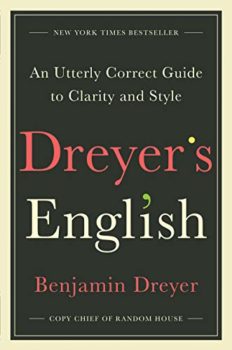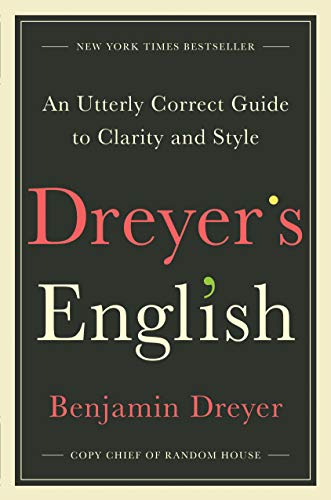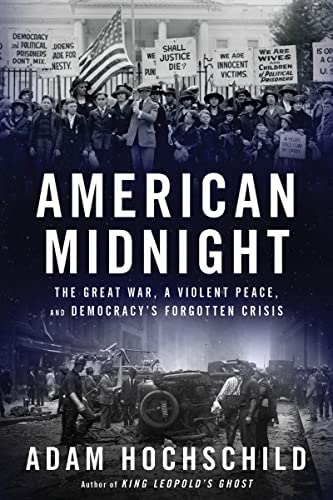
So, chances are you’re convinced you know perfectly well how to write clear English. But, just to be sure, take this quick quiz: How many of these rules do you follow when you write?
- Never begin a sentence with “and” or “but.”
- Never split an infinitive.
- Never end a sentence with a preposition.
- Contractions aren’t allowed in formal writing.
- The passive voice is to be avoided.
- Sentence fragments are bad.
- A person must be a “who,” not a “that.”
- “None” is singular and, dammit, only singular.
- “Whether” must never be accompanied by “or not.”
- Never introduce a list with “like.”
If you learned English many years ago, as I did, chances are you heed at least some of these ten rules. It took me decades of reading and writing to unlearn them (and I still have trouble with Numbers 2, 5, and 8). So, if you really want to know how to write clear English, I strongly recommend you read
Benjamin Dreyer‘s superb new book,
Dreyer’s English, and take his rebuttal of all these rules to heart. The man makes sense.
Dreyer’s English: An Utterly Correct Guide to Clarity and Style by Benjamin Dreyer (2019) 284 pages ★★★★★
A funny, commonsense guide to how to write clear English
In
Dreyer’s English, the top copyeditor at Random House will take you on a journey through such topics as “67 Assorted Things to Do (and Not to Do) with Punctuation” and “A Little Grammar Is a Dangerous Thing.” Yes, I know this stuff can be boring. But take my word for it: Dreyer makes it fun.
At times, Dreyer is dogmatic (as he is well entitled to be, in my opinion): “Only godless savages eschew the series comma,” he writes. “No sentence has ever been harmed by a series comma, and many a sentence has been improved by one.” (Amen.)
And the book is funny, sometimes very funny.
So, what’s wrong with ending a sentence with a preposition?
For instance, Dreyer relates “The Celebrated Ending-a-Sentence-with-a-Preposition-Story.” It goes like this in a conversation between a Southern Gal and a Frosty Matron sitting together at a posh dinner party:
“Southern Gal, amiably, to Frosty Matron: So where y’all from?
“Frosty Matron, no doubt giving Southern Gal a once-over through a lorgnette: I’m from a place where people don’t end their sentences with prepositions.
“Southern Gal, sweetly, after a moment’s consideration: OK. So where y’all from, bitch?”
So, you’d have to admit, this gets the point across. And
Dreyer’s English is all about how to write clear English. Which means getting the point across as unmistakably as possible.
One chapter that’s worth the price of the book
Nearly every recommendation Dreyer makes in this book is worth following. But one chapter stands out; it’s worth the price of the book. That’s Chapter 12, titled “The Trimmables.” It consists of a long list of phrases that include “Two Words Where One Will Do.” Dreyer calls it “a collection of easily disposed of redundancies.” It includes such gems as the following:
- “absolutely essential,” because if it’s essential isn’t that enough?;
- “cameo appearance,” which is redundant;
- “crisis situation,” since when is a crisis not a situation?;
- “earlier in time,” as though an event could be earlier in something other than time;
- “few in number,” which is obviously redundant;
- “free gift” (duh!);
- “future plans,” which surely must be plans made in the present; and
- “gather together,” because how else would people gather?
Well, you get the point. There are lots of these in
Dreyer’s English. And I’ll bet that, like me, you haven’t realized every one of these was redundant. Or, as Dreyer puts it, trimmable.
This book reflects many of my own peeves and concerns about how to write clear English
Nearly thirty years ago I wrote a book called
How to Write Successful Fundraising Letters. (That book is now in its third edition with the title
How to Write Successful Fundraising Appeals. Because nonprofits now use email and the Web as well as letters to raise money.) My favorite chapter, then and now, is one called “You’re Writing for Results—Not for a Pulitzer Prize.” When I glanced back at that chapter while reading
Dreyer’s English, I was amused to discover that a fair amount of what I’d written reflects many of the same peeves and concerns in Dreyer’s book. But please understand: I’m not accusing the man of plagiarizing. (The chances he would ever have come across my book seem vanishingly small.) Instead, as a writer and editor myself, I simply want to emphasize how strongly I agree with Dreyer’s approach to the language.
About the author
“Benjamin Dreyer sees language the way an epicure sees food. And he sees sloppiness everywhere he looks.” So goes the subhead in a
profile of the author by Sarah Lyall in the
New York Times (February 1, 2019). He’s been working since the 1990s, first as a proofreader, then a copyeditor, and finally in his current job at Random House. He’s now what Lyall describes as the publisher’s “style-arbiter-of-last-resort over several hundred original titles a year.” Dreyer is a vice-president, executive managing editor, and copy chief at the company. He’s active on Twitter, where he explains how to write clear English to tens of thousands of followers.
For related reading
This title is featured on
Good books about dictionaries, libraries, and language.
I’ve reviewed four other books about the English language and dictionaries:
A book like
Dreyer’s English doesn’t fit neatly into any of the categories I’ve constructed for this blog. Is copyediting a science? Probably not. Is it linguistics? Not really. But that’s the closet I can find to a classification that fits. After all, my list of science books includes Kory Stamper’s. So, ready or not, here’s where you’ll find other good books that are at least vaguely related to the one reviewed here:
Science explained in 10 excellent popular books.
And you can always find all the latest books I’ve read and reviewed, as well as my most popular posts, on the
Home Page.
 So, chances are you’re convinced you know perfectly well how to write clear English. But, just to be sure, take this quick quiz: How many of these rules do you follow when you write?
So, chances are you’re convinced you know perfectly well how to write clear English. But, just to be sure, take this quick quiz: How many of these rules do you follow when you write?


























